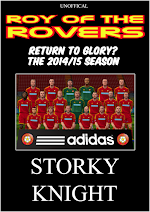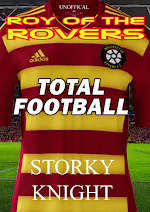Like most soccer rivalries the intensity grew in the late 70s as tribalism replaced the general football community. No longer did fans enjoy matches every weekend attending local teams and having a favourite. Now, in Melchester you were a Red or a Blue and one man did more than most to feed the hate between the two clubs; legendary Melboro' manager Andy Jackson.
Jackson bleeds blue and expected his players to fight for his club, to make up for a lack of ability with heart and desire. Melboro', under Jackson, fought above their weight class; team spirit compensating for a lack of resources and investment.
Having never truly established themselves in the First Division, Andy Jackson created a legacy which began in the mid-70s with promotion. A team of few stars, 'Boro built from a solid base, Bill Bennett the classy sweeper led the side. Bennett played with a continental flair, a neat passer who often found himself on the scoresheet. Including a spectacular volley in the derby (left).
The balding defender would be the foundation of Melboro's success. Moulding a team of journeyman, without a genuine goal threat; Jackson's tactical nous led the Blues into Europe for the first time in their history with back to back UEFA Cup campaigns in 1977/78 and 1978/79. But one thing would continue to bug the great manager, his inability to defeat Roy Race and Melchester Rovers. Too often for his liking the River Mel Derby would end in heavy defeat (5-0 in 77/78 and 4-1 in 79/80) and a glut of Race goals.
But come 1980/81 - Jackson would have his revenge!
Geoff Giles had fallen out of favour at Rovers after the emergence of Vic Guthrie and Steve Naylor and was itching for a new challenge. Remarkably, Jackson pulled off one of the most shocking transfers ever, somehow persuading Race to break the unwritten rule of not transferring players between the two rivals. Giles signed for Melboro' along with Rovers' unsettled 'Super-Sub' Roger Dixon.
 Roy would later admit that he had made an error letting Giles go as the England international found a new lease of life across the river. Jackson made Giles the attacking focus and new captain of his team, a role which he relished.
Roy would later admit that he had made an error letting Giles go as the England international found a new lease of life across the river. Jackson made Giles the attacking focus and new captain of his team, a role which he relished.With Rovers struggling in the league, Giles destroyed his former club in the derby at Mel Park, scoring twice past debutant goalie Walter Williams. The Rovers fans were amazed at how their cast-off, defensive minded Giles dominated in an attacking midfield position. Boro' won 2-1 and Rovers were relegated later that season. For the third time in four seasons Melboro' finished above their great rivals, but of course Rovers had claimed the title in 1979/80, something Melboro' were still to achieve.
 However, Geoff Giles' rejuvenation would prove the highlight of the next few years. Danefield United, Kingsbay, Carford City and Portdean proving too strong for Jackson's triers. From the highs of the late 70s, Melboro' were back in mid-table, behind big spenders Stambridge City, Highboro' United, Walford Rovers and resurgent Melchester and Blackport. Roy Race even had time during his brief spell at Walford to thrash Melboro' 7-1, scoring four times (1983/84). Andy Jackson was not amused!
However, Geoff Giles' rejuvenation would prove the highlight of the next few years. Danefield United, Kingsbay, Carford City and Portdean proving too strong for Jackson's triers. From the highs of the late 70s, Melboro' were back in mid-table, behind big spenders Stambridge City, Highboro' United, Walford Rovers and resurgent Melchester and Blackport. Roy Race even had time during his brief spell at Walford to thrash Melboro' 7-1, scoring four times (1983/84). Andy Jackson was not amused! But his reign would go on for four more years.
But his reign would go on for four more years.Fittingly Rovers' second league match after the Basran Tragedy would be the derby. A match that began with solemn reflection soon turned into a blood and thunder derby. Jackson had his players and the crowd pumped up, the patched up Rovers couldn't handle them and a referee who melted in the hostile atmosphere. In a ding-dong battle Melboro' ran out 3-2 winners, Johnny Telford scoring for a side featuring new signing, Scottish striker John MacVay.
 With Melboro' no closer to the league title Jackson left, with fiery young Walford boss Jack Cassidy chosen to replace him part-way through the 1988/89 season. In his first derby, Cassidy had the chance to write his name into history and relegate Melchester Rovers. But the young Rovers team fought back from an early Viv Hamilton goal to nick a 3-1 win and safety.
With Melboro' no closer to the league title Jackson left, with fiery young Walford boss Jack Cassidy chosen to replace him part-way through the 1988/89 season. In his first derby, Cassidy had the chance to write his name into history and relegate Melchester Rovers. But the young Rovers team fought back from an early Viv Hamilton goal to nick a 3-1 win and safety. Cassidy, however, was soon tossed aside, with the charismatic Ralph "Flash" Gordon seen by the board as the new Andy Jackson. Gordon was a firm believer in all-out-attacking football and played a fluid 4-2-4 system with defenders encouraged to charge forward. Crowds grew and a growing television audience appreciated the entertainment provided by Gordon's cavalier approach.
Cassidy, however, was soon tossed aside, with the charismatic Ralph "Flash" Gordon seen by the board as the new Andy Jackson. Gordon was a firm believer in all-out-attacking football and played a fluid 4-2-4 system with defenders encouraged to charge forward. Crowds grew and a growing television audience appreciated the entertainment provided by Gordon's cavalier approach.Dynamic forward Billy Malcolm provided the pace essential to the system, but again Boro' were still lacking in stars. However, Gordon had found some much needed consistency, guiding the club to top ten finishes in all three of his seasons in charge. Yet, while certainly an attractive side, Melboro' still could not find that extra something to challenge for trophies.
 Ralph Gordon's reputation had grown, now regarded as one of the top bosses in the game, talked about in the media in the same breath as Rudi Marik, Derek Mason and Mario Tachi. And when Roy Race shockingly resigned as Melchester Rovers manager in October 1992, Flash was the only realistic applicant. Rovers had poached their boss and the Melboro' fans seemed set for another long period of watching their bitter rivals lifting cup after cup.
Ralph Gordon's reputation had grown, now regarded as one of the top bosses in the game, talked about in the media in the same breath as Rudi Marik, Derek Mason and Mario Tachi. And when Roy Race shockingly resigned as Melchester Rovers manager in October 1992, Flash was the only realistic applicant. Rovers had poached their boss and the Melboro' fans seemed set for another long period of watching their bitter rivals lifting cup after cup.But, the first few years of Premiership football were anything but predictable. Two tragedies befell Melchester Rovers, both having a tremendous knock-on effect on fortunes across the river.
Firstly, Roy Race's helicopter crash, retirement and appointment as manager of AC Monza, left the Rovers without their talisman. Melboro' found themselves top dogs in the Midlands thanks to the decline of Rovers rather than their own improvements.
Penny Race's death in Italy, our second tragedy, sent Roy's son, Rocky, off the rails. The supremely talented, yet temperamental, forward had already scored the winner in the 1994 FA Cup Final, but was also immature and lacking self-control on the field. Midway through the 1995/96 season, days after his mother's death, Rocky was sent-off after striking former team-mate Matthew Croker. He wanted out and Melboro' provided that option.
 In the eyes of their fans, Melboro' had gotten one over their old foes and in taking a Race, had they changed the balance of power forever? It would seem so! On his return to Mel Park in the 4th Round of the FA Cup (1996/97) Rocky would knock out his old club with his version of Racey's Rocket. Rocky's goals took them all the way to Wembley, where he scored a cracking overhead volley to win the Cup (right)!
In the eyes of their fans, Melboro' had gotten one over their old foes and in taking a Race, had they changed the balance of power forever? It would seem so! On his return to Mel Park in the 4th Round of the FA Cup (1996/97) Rocky would knock out his old club with his version of Racey's Rocket. Rocky's goals took them all the way to Wembley, where he scored a cracking overhead volley to win the Cup (right)!Many spectacular goals followed, including a brilliant solo strike against his returned father's Rovers in 3rd Round of the League Cup (1997/98). But the discipline problems had never gone away and Rocky was sent-off for fighting with his captain Peter Beck, a situation deemed untenable by Beck, his manager and the board. It was the third red of his short career and as personal issues with his father subsided, Rocky returned to Mel Park in a swap deal for Craig Foster.

By the end of that season, it seemed Boro' had the better of the deal, as Foster netted against his former club in the F.A. Cup Semi-Final to send Melboro' back to Wembley. Although their defence would end in disappointment, the Blues had a new hero and Craig Foster was well on his way to international honours.
Melboro' were not only competing with Rovers in the transfer market, now they were a genuine force on the field. Foster's signing critical in establishing them well and truly as more than just "noisy neighbours!"
Notes:
- For Melchester Rovers' main rivals there are very few players named
- I have not listed anything from Milboro' or Millborough above, although there is plenty of evidence to suggest they are the same teams
- Melboro' are never called Melborough Town in ROTR, but it is printed on the side of the stadium once. Melboro' Town also feature in Twisty in the Bullet comic.
List of players:
G - Kennedy
D - Baxter, Bill Bennett, Dawson, Ellson, Rogers
M - Peter Beck, Bishop, Britten, Geoff Giles, Viv Hamilton, Lacey, Johnny Telford, Thomas
F - Roger Dixon, Craig Foster, Ted Hedges, John MacVay, Billy Malcolm, Rocky Race












2 Comments
I started wondering the other day if Melboro' might have been a renamed Shermall, after the latter vanished without trace after their abortive attempt to take over Melchester in the early 60s. Both teams were situated on the opposite side of the Mel.
ReplyDeleteIt is a shame Shermall disappeared. I don't think they can become Melboro' as Melboro' are definitely Milboro' and Milboro' first appear in 1968/69 when Shermall are still around.
Delete